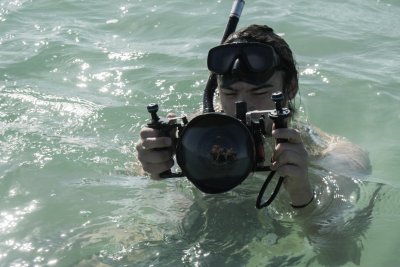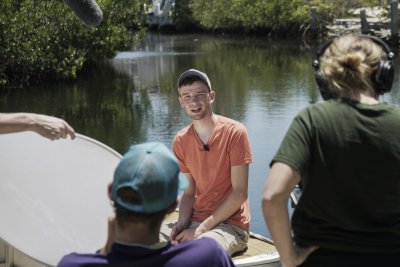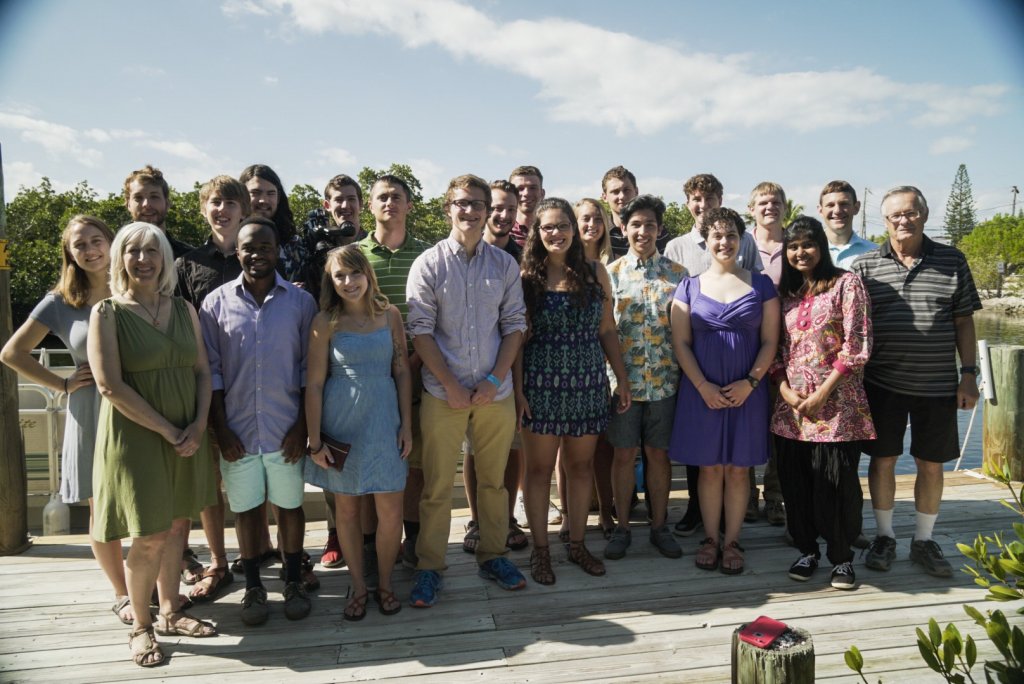Biology and film students dive into legacy of GC’s marine biology program in Florida

For Goshen College students who spent May term in the Florida Keys, immersion was not limited to the time spent snorkeling.
Six film students joined the 12 biology students for the annual three-week course at the college’s J. N. Roth Marine Biology Station in Layton, Florida on Long Key. In it’s 51st year of operation, this year’s course was unique in that it combined elements of communication and biology for an immersion in not only the community of Layton, but the differing disciplines as well.
Biology students were enrolled in an upper level marine biology course, taught by Jody Saylor, associate professor of biology, while communication students took part in the class titled Advanced Digital Media Immersion, taught by Kyle Hufford, assistant professor of communication and FiveCore Media general manager.
The film students literally got in the water with the biology students to participate in and film some of their activities and projects.
“One part that was really striking for me was how much I learned about marine biology,” said Riley Mills, a senior communication major. “I wasn’t participating in their research, but filming them and talking with the students gave us a lot to learn.”
Saylor agreed, saying, “It was exciting for me and the biology students to share our love of science and to introduce new ecology concepts and new organisms to the film students, but it was also interesting to see the course from the film student’s perspective. It made me think about the course in new ways.”

The film students worked to create a documentary focused on highlighting the legacy of the marine biology program and its relationship with the surrounding community.
At times, the film crew went door-to-door in to see if community members were interested in being interviewed. “The students had to figure out who to talk to and do a lot of research on the ground to arrange things,” Hufford said.
He added that the town of Layton played a big part in the development of the story. “The community itself is really a character in the documentary, and the majority of interviews were community members,” he said.

Being outside of Goshen offered film students the chance to engage with storytelling in a different way.
“The opportunities we got in Layton were beyond what we have here,” said Mills. “We have strong ties in Goshen, whereas in Layton we don’t have those same connections. Learning how to become a piece of the community and work with the community was a challenge, but something we wouldn’t have [been able to do] if we had stayed in Goshen.”
They filled the roles of a traditional film crew, including producer and director, and worked to develop skills in working as a team to produce a large-scale product. The course also gave film students the opportunity to work with different equipment and develop a different set of skills. With the use of a drone to capture aerial footage and small, underwater cameras to capture shots of biology students working beneath the surface, film students gained a wider understanding of the tools needed for different settings.
“While we were learning what it was like to build a documentary,” said Mills, “we also learned about biology and the effects that the center has had on the community.”
Sophomore biology student Jose Chiquito Galvan spoke to the connection between the disciplines that took place in Layton.
“The film students were amazing to work with,” he said. “They provided us as Goshen College a much needed way to reconnect with the community of Layton. Through their film interviews and work, we were able to better understand the community we lived and studied in.”

“The biology students were learning from the film students and the film students were learning from the biology students, and they were sharing back and forth what they were doing,” said Hufford. “Everybody was curious about each other’s projects and what they were working on.”
The course concluded with both biology and film students presenting their work to the entire group. Biology students presented research topics that they had developed over the three-weeks in Florida. Film students presented two short films highlighting themes that will be furthered in the documentary.
While most of the footage for the documentary was filmed during the course in Florida, the documentary will be completed after a fall semester class in the coming school year does post-production work. The full documentary is set to release in early 2018.
Read more about the class activities on their blog.




